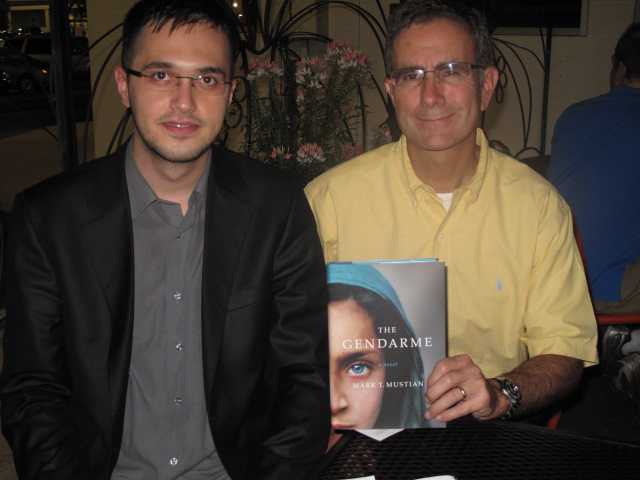adresinden T-346/03 nolu dosya aratilarak ulasilabilinir.
ORDER OF THE COURT OF FIRST INSTANCE
17 December 2003 (1)
(Non-contractual liability of the Community – Action manifestly lacking any foundation in law)
In Case T-346/03,
Grégoire Krikorian, residing in Bouc-Bel-Air (France),
Suzanne Krikorian, residing in Bouc-Bel-Air,
Euro-Arménie ASBL, established in Marseille (France),
represented by P. Krikorian, lawyer,
applicants,
v
European Parliament, represented by R. Passos and A. Baas, acting as Agents, with an address for service in Luxembourg,
Council of the European Union, represented by S. Kyriakopoulou and G. Marhic, acting as Agents,
and
Commission of the European Communities, represented by F. Dintilhac and C. Ladenburger, acting as Agents, with an address for service in Luxembourg,
defendants,
APPLICATION for compensation for the non-material damage suffered by the applicants on account of, inter alia, recognition of Turkey’s status as a candidate for accession to the European Union,
THE COURT OF FIRST INSTANCE
OF THE EUROPEAN COMMUNITIES,
composed of: B. Vesterdorf, President, P. Mengozzi and M.E. Martins Ribeiro, Judges,
Registrar: H. Jung,
makes the following
Order
Facts and procedure
1.
By application lodged at the Registry of the Court of First Instance on 9 October 2003, the applicants brought this action for damages in which they seek compensation for the harm caused to them by, inter alia, recognition of Turkey’s status as a candidate for accession to the European Union, although that State has refused to acknowledge the genocide perpetrated in 1915 against the Armenians living in Turkey.
2.
The applicants claim that the Court of First Instance should:
– declare that the resolution of the European Parliament of 18 June 1987 on a political solution to the Armenian question (OJ 1987 C 190, p. 119) (‘the 1987 resolution’) has binding legal force in respect of the European Community;
– declare that the defendants are in serious breach of Community law to the prejudice of the applicants;
– order the defendants to pay each of the applicants the sum of EUR 1 in damages;
– order the defendant to pay the costs, assessed at EUR 30 000, plus interest.
3.
In a separate document, lodged at the Registry of the Court of First Instance on 9 October 2003, the applicants applied for interim measures seeking, in particular, suspension of the procedure for examining the Republic of Turkey’s candidature for accession to the European Union by the defendant institutions and asking that resumption of that procedure be made conditional on prior acknowledgement by that State of the abovementioned genocide.
Law
Arguments of the parties
4.
According to the applicants, the first element giving rise to the non-contractual liability of the Community is the fact that, at its meeting in Helsinki (Finland) on 10 and 11 December 1999, the European Council officially recognised the Republic of Turkey’s status as a candidate for accession to the European Union, but did not make that accession conditional on the prior acknowledgement by that State of the abovementioned genocide. Moreover, they note that the Republic of Turkey enjoys an accession partnership, which provides in particular for significant assistance to enable that State to begin the irreversible process of accession. They refer in that connection to several documents, including Council Regulation (EC) No 390/2001 of 26 February 2001 on assistance to Turkey in the framework of the pre-accession strategy, and in particular on the establishment of an Accession Partnership (OJ 2001 L 58, p. 1), Council Regulation (EC) No 2500/2001 of 17 December 2001 concerning pre-accession financial assistance for Turkey and amending Regulations (EEC) No 3906/89, (EC) No 1267/1999, (EC) No 1268/1999 and (EC) No 555/2000 (OJ 2001 L 342, p. 1) and Council Decision 2001/235/EC of 8 March 2001 on the principles, priorities, intermediate objectives and conditions contained in the Accession Partnership with the Republic of Turkey (OJ 2001 L 85, p. 13).
5.
The defendant institutions therefore blatantly failed to have regard to the 1987 resolution. In that resolution, the Parliament declared that the Turkish Government’s refusal to acknowledge that genocide constituted an insurmountable obstacle to the examination of the Republic of Turkey’s possible accession.
6.
According to the applicants, the 1987 resolution is a legal act which, in the same way as recommendations and opinions, can produce legal effects (Case C-322/88 Grimaldi [1989] ECR 4407. In this case, the 1987 resolution has or is intended to have legal effects going beyond the internal organisation of the Parliament’s work (Joined Cases T-222/99, T-327/99 and T-329/99 Martinez and Others v Parliament [2001] ECR II-2823). In that resolution the Parliament intended publicly to lay down a special condition for the Republic of Turkey’s accession, namely the prior acknowledgement by that State of the genocide in question. Moreover, the words used in the resolution leave no room for ambiguity as to the intention of that Community institution.
7.
The applicants note in that connection that, since the entry into force of the Single European Act on 1 July 1987, the Parliament had the power under Article 237 of the EEC Treaty, since repealed, to object to the Republic of Turkey’s accession; they state that the requirement of the assent of the Parliament is now laid down in Article 49 of the Treaty on European Union. They point out that the 1987 resolution was published – and therefore brought to their knowledge – after that date, namely on 20 July 1987.
8.
It follows that the 1987 resolution gave rise to a legitimate expectation on their part that the Parliament would, if necessary, exercise its right of veto on the Republic of Turkey’s accession or, more generally, that that institution would object to examination of the Republic of Turkey’s candidature as long as the latter had not acknowledged the genocide in question. The situation noted in paragraph 4 above constitutes an infringement of that legitimate expectation.
9.
The applicants therefore claim that, since the Community set itself an obligation of conduct and an obligation as to the result to be achieved, the mere fact that there has been a failure to have regard to the requirements of the 1987 resolution suffices to prove a sufficiently serious breach of Community law.
10.
The applicants also rely on an infringement of several fundamental rights, including the right not to be subjected to inhuman or degrading treatment and the right to respect for private life, laid down in Articles 3 and 8 of the European Convention for the Protection of Human Rights and Fundamental Freedoms, signed in Rome on 4 November 1950.
11.
Finally, the applicants claim that, as members of the Armenian community and descendants of survivors of the genocide in question, they have suffered non-material damage.
12.
In that respect, they state that the conduct of the defendant institutions is an affront to their dignity, in view of the fact, as they claim, that the memory of the victims of that genocide and the concern for historical truth are an integral part of the dignity of all Armenians. Moreover, since that genocide is an integral part of the history and identity of the Armenian people, the identity of the applicants is itself irreparably affected by the conduct of the defendant institutions. Finally, calling into question the reality of the abovementioned genocide brings about marginalisation and a feeling of inferiority within the Armenian community. Thus the attitude of the Republic of Turkey has the effect of ostracising the applicants, since they are regarded as second-rate victims. Those circumstances result in the applicants’ harbouring feelings of deep injustice, which also prevents them from completing the mourning process satisfactorily.
Findings of the Court
13.
Under Article 111 of the Rules of Procedure of the Court of First Instance, where an action is manifestly lacking any foundation in law, the Court of First Instance may, by reasoned order and without taking further steps in the proceedings, give a decision on the action. In the light of the application, the Court of First Instance considers that it is able to give a decision on the substance of the present action, without hearing the observations of the defendant institutions and without opening the oral procedure.
14.
It is settled case-law that, for the Community to incur non-contractual liability within the meaning of the second paragraph of Article 288 EC a number of conditions must be satisfied, namely the illegality of the conduct alleged against the institutions, the fact of damage and the existence of a causal link between the alleged conduct and the damage complained of (Case 26/81 Oleifici Mediterranei v EEC [1982] ECR 3057, paragraph 16; Case T-175/94 International Procurement Services v Commission [1996] ECR II-729, paragraph 44; Case T-336/94 Efisol v Commission [1996] ECR II-1343, paragraph 30; and Case T-267/94 Oleifici Italiani v Commission [1997] ECR II-1239, paragraph 20).
15.
If any one of those conditions is not satisfied, the entire action must be dismissed and it is unnecessary to consider the other conditions for non-contractual liability on the part of the Community (Case C-104/97 P Atlanta v European Community [1999] ECR I-6983, paragraph 65).
16.
In this case, the applicants plead, essentially, two circumstances capable of giving rise to the non-contractual liability of the Community, namely recognition of the Republic of Turkey’s status as a candidate for accession to the European Union by the European Council at Helsinki on 10 and 11 December 1999, and the fact that that State enjoys a European Union accession partnership.
17.
As regards recognition of the Republic of Turkey’s status as a candidate for accession to the European Union, it must be stated that that is the result of an act of the European Council, which is not an institution of the Community within the meaning of Article 7 EC. As has been noted at paragraph 14 above, only the conduct of an institution of the Community can give rise to the non-contractual liability of the Community. In those circumstances, the argument that recognition of the Republic of Turkey’s status as a candidate for accession to the European Union gives rise to liability on the part of the Community must be rejected.
18.
As regards the fact that the Republic of Turkey enjoys a European Union accession partnership, the applicants rely on the argument that the conduct of the defendant institutions is unlawful because it is contrary to the 1987 resolution.
19.
It suffices to point out that the 1987 resolution is a document containing declarations of a purely political nature, which may be amended by the Parliament at any time. It cannot therefore have binding legal consequences for its author nor, a fortiori, for the other defendant institutions.
20.
That conclusion also suffices to dispose of the argument that the 1987 resolution could have given rise to a legitimate expectation, on the part of the applicants, that the institutions would comply with that resolution (see, to that effect, Joined Cases 87/77, 130/77, 22/83, 9/84 and 10/84 Salerno and Others v Commission and Council [1985] ECR 2523, paragraph 59, and Joined Cases C-213/88 and C-39/89 Luxembourg v Parliament [1991] ECR I-5643, paragraph 25).
21.
As regards the alleged breach of fundamental rights (see paragraph 10 above), it is sufficient to note that the applicants merely claim that such a breach took place, without explaining how that follows from the conduct of the defendant institutions complained of in this case.
22.
For the sake of completeness, it should be pointed out, first, that the applicants have manifestly not shown that the requirement of a causal connection is satisfied in this case.
23.
It is settled case-law that there must be a direct link of cause and effect between the fault allegedly committed by the institution concerned and the damage pleaded, the burden of proof of which rests on the applicant (Case T-220/96 EVO v Council and Commission [2002] ECR II-2265, paragraph 41, and the case-law cited). Moreover, the wrongful conduct of the institution concerned must be the direct and determining cause of that damage (orders of the Court of First Instance in Case T-614/97 Aduanas Pujol Rubio and Others v Council and Commission [2000] ECR II-2387, paragraph 19; Joined Cases T-611/97, T-619/97 to T-627/97 Transfluvia and Others v Council and Commission [2000] ECR II-2405, paragraph 17; and Case T-201/99 Royal Olympic Cruises and Others v Council and Commission [2000] ECR II-4005, paragraph 26, confirmed on appeal by order of the Court of Justice of 15 January 2002 in Case C-49/01 P Royal Olympic Cruises and Others v Council and Commission, not published in the ECR).
24.
In this case, it appears from the arguments put forward by the applicants that the alleged non-material damage is the result of the refusal by the Turkish Government to acknowledge the genocide in question rather than of the conduct of the defendant institutions complained of. In those circumstances, the applicants have not in any way shown that the conduct of the defendant institutions complained of is the direct and determining cause of the alleged damage.
25.
Secondly, as regards the requirement that the applicants must have suffered actual and certain damage, the applicants clearly confined themselves in their application to relying in general terms on non-material damage caused to the Armenian community, without giving the least indication as to the nature or extent of the damage which they consider they had suffered individually. Therefore the applicants have supplied no information that would enable the Court to find that the applicants in fact suffered actual and certain damage themselves (see, to that effect, Case T-99/98 Hameico Stuttgart and Others v Council and Commission [2003] ECR II-2195, paragraphs 68 and 69).
26.
In those circumstances, the applicants have manifestly not shown that the conditions under which the Community will incur non-contractual liability are satisfied.
27.
It follows from the foregoing that the claims for compensation are manifestly unfounded.
Costs
28.
In accordance with Article 87(2) of the Rules of Procedure, the unsuccessful party is to be ordered to pay the costs if they have been applied for in the successful party’s pleadings.
29.
However, in the present case, pursuant to Article 111 of the Rules of Procedure, the order is made before the defendants have lodged their defence and had the opportunity to apply for costs. It is therefore necessary to apply Article 87(3) of the Rules of Procedure, according to which the Court of First Instance may order the costs to be shared where the circumstances are exceptional.
30.
Since the applicants have been unsuccessful, they must be ordered to pay the costs.
On those grounds,
THE COURT OF FIRST INSTANCE,
hereby orders:
1. The action is dismissed.
2. The applicants shall bear the costs.
Luxembourg, 17 December 2003.
H. Jung
B. Vesterdorf
Registrar
President
 PanARMENIAN.Net – Recently, the relations between Turkey and France were rather strained. The adoption of a bill criminalizing the denial of Armenian Genocide would further exacerbate them, according to a Turkish Studies expert.
PanARMENIAN.Net – Recently, the relations between Turkey and France were rather strained. The adoption of a bill criminalizing the denial of Armenian Genocide would further exacerbate them, according to a Turkish Studies expert.







